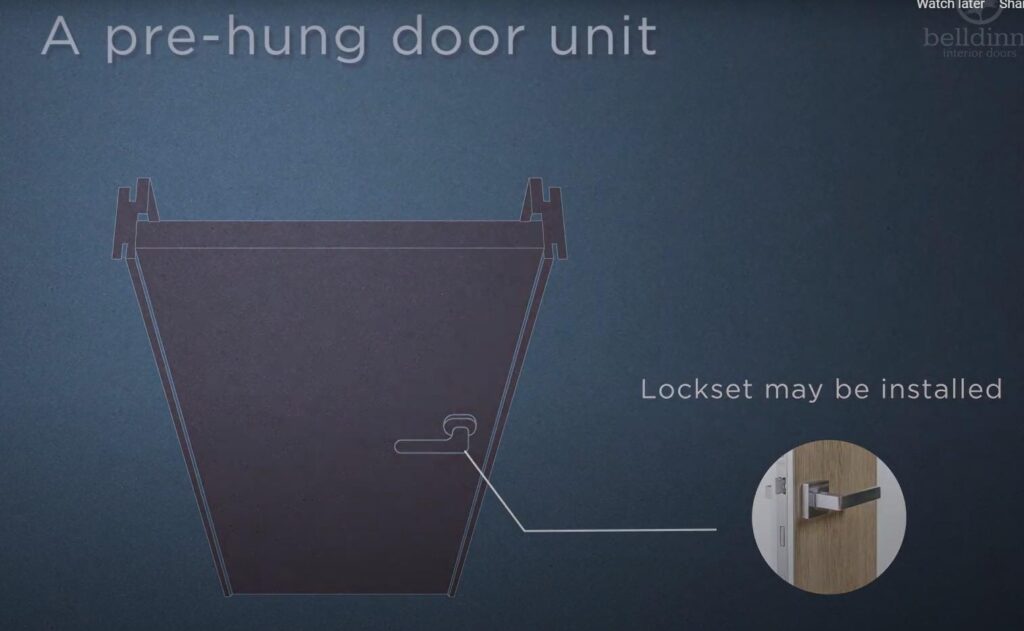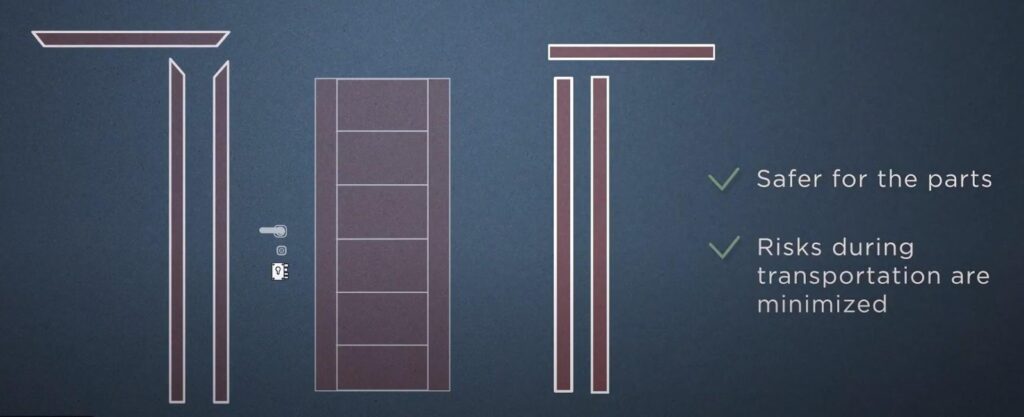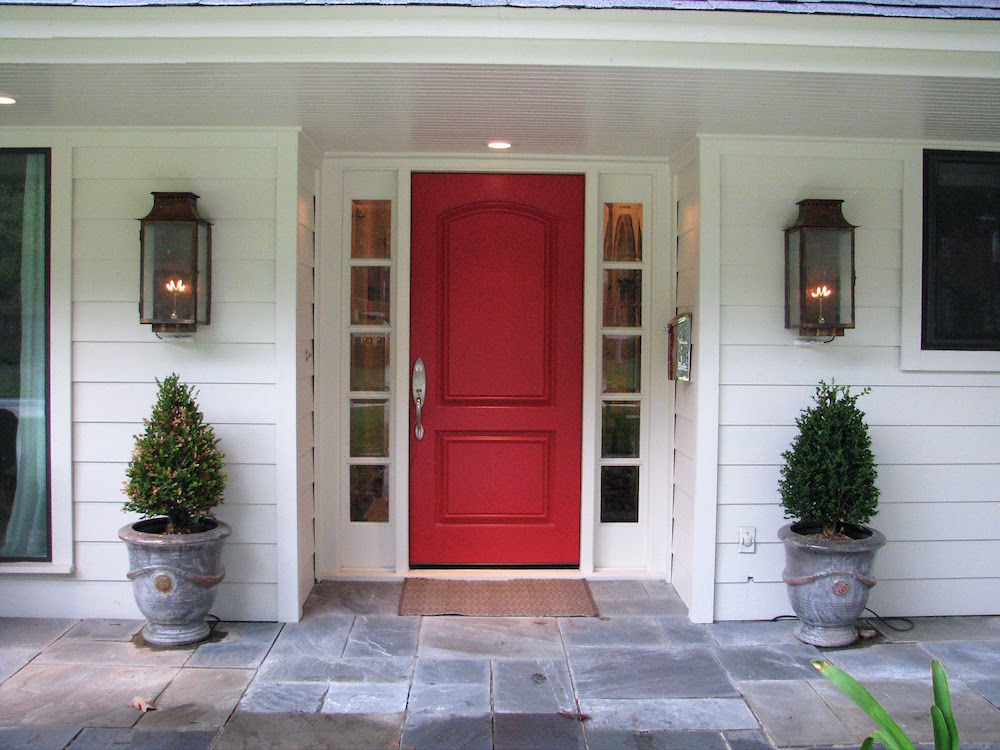The decision to purchase new interior doors may seem like an easy decision, but in truth, there are many factors that need to be taken into account. Are you simply replacing an interior door, or are you looking for a new and different style? There are many different types and styles of doors available, and it is a good idea to familiarize yourself with the different available options before making a decision.
There are two main door types, pre-hung and slab doors. Both doors have their own unique benefits, but the decision ultimately will depend on your specific needs and requirements. So, when should you choose a pre-hung door over a slab door, and vice versa? Continue reading and we will assist you in understanding the difference, so that you can make an informed decision.
WHAT IS A PRE-HUNG DOOR?

A pre-hung door has a big benefit, and that is that it comes assembled. This door will come as one unit, with the frame already attached to the slab. In addition, the hinges are already in place on the door, which allows it to open and close right out of the box. All the buyer needs to do is install the doorknob and you are ready to go!
The pre-hung door unit has five core parts, which include the door itself, the frame, the hinges, pre-cut mortises, and a hole for the doorknob. Let’s take a closer look at the pros and cons of pre-hung doors.
PROS
Pre-hung doors have many advantages, including the following:
- The door is completely ready for installation upon purchase
- The installation process is simplified for even the least handy buyers
- The door has pre-attached hinges and pre-cut mortises
- All necessary hardware is included
- All that needs to be done is to secure the final parts in place
Pre-hung doors provide a major benefit for new construction projects, as they make a fast and efficient process of door assembly and installation.
These types of doors can be easily installed in an incomplete construction area since the frame is already included. There is also no need to build the frame from scratch, which saves precious time when it is necessary to meet a project completion deadline.
If you are looking to replace an interior door within your home, and the existing door frame is damaged upon repair, then it is usually best to demolish the pre-existing door area and replace it with a pre-hung door.
Pre-hung doors are usually the door of choice for a home’s exterior. They are weather-resistant and do not need a tight custom fit. Additionally, if you do not hire a professional, installing an exterior slab door can present a challenge to those with less experience.
CONS
Although pre-hung doors have many advantages, there are also a few drawbacks:
- They are typically more expensive than slab doors
- They may require adjustments to be installed correctly
- They are much heavier than slab doors, and may require installation assistance
Because of the convenience it offers, a pre-hung door is expensive compared to a slab door, and if budget is a factor, you can save a fair amount of money by purchasing a slab door. One of the main cons of a pre-hung door is that it is heavy and hard to manage, usually weighing up to 100 pounds. Due to its weight, installation will usually require assistance from a few people to ensure correct positioning and adjustments. Ultimately, it is a matter of weighing affordability versus convenience.
WHAT IS A SLAB DOOR?

A slab door is a basic door that does not include a frame, pre-cut holes for hinges, or hardware. It can be made of wood, fiberglass or steel, and can be either flat or paneled. If you are looking for a more customizable door, a slab door can be a great choice, although you need to be aware that a slab door is a bit more challenging to install than a pre-hung door.
PROS
- Slab doors are less expensive than pre-hung doors
- They enable installation of vintage doors
- Slab doors offer many customization options
- They are lighter and easier to handle
If budget is a deciding factor for you, a slab door is a good option, especially for interior doors. When used as an interior door, a slab door will give you greater design flexibility and has no waterproofing issues. The trade-off with regard to customization options is a more time-consuming installation, but if that doesn’t bother you, then a slab door might be the right fit for you.
CONS
- Slab doors require additional carpentry to ensure a good fit
- You may need professional help to make and install the frame
- They require mortises to be cut
Customization and installation of a slab door takes practice, patience, and a steady hand. Installing a slab door may be the right choice if you are doing one-for-one installation, as the new door will have the same specifications as the previous door. However, the process is much more time consuming if there is variation in size or shape. In addition, if you are planning to install slab doors throughout your home and don’t have the necessary experience, hiring professionals to assist can be quite costly.
WHEN SHOULD YOU CHOOSE A PRE-HUNG DOOR?
If you are undertaking a full home renovation, the best option may very well be to use pre-hung doors. They are strong, durable and will save you time as compared to slab doors. If you are replacing an exterior door, or if an existing door frame is completely damaged or rotten, a pre-hung door is usually the way to go. If an existing door frame is beyond salvage, simply take out the damaged structure and install your pre-hung door.
WHEN SHOULD YOU CHOOSE A SLAB DOOR?
On the other hand, if you are budget-conscious and need to replace a large number of doors, slab doors may be the better option. If your door frames are all in decent condition, and you don’t mind the additional installation work, you can use slab doors of the same size to replace your previous doors.






